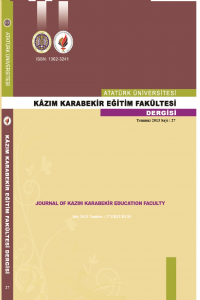MATEMATĠK ÖĞRETMENLERĠNĠN PEDAGOJĠK ALAN BĠLGĠLERĠNĠN ÖLÇME-DEĞERLENDĠRME BĠLGĠSĠ BĠLEġENĠ BAĞLAMINDA ĠNCELENMESĠ / An Investigation of Mathematics Teachers’ Pedagogical Content Knowledge in the Area of Assessment Knowledge
Öz
Bu çalışmanın amacı ortaöğretim matematik öğretmenlerinin ölçmedeğerlendirme
yeterlilik düzeylerini belirlemektir. Bu amaçla İran’da düzenlenen
XII. Ulusal Matematik Eğitim Sempozyumuna katılan 40 ortaöğretim matematik
öğretmeni ile çoklu durum çalışması yapılmıştır. Çalışmada öğretmenlerin
ölçme-değerlendirme bilgileri 4 bileşen bağlamında incelenmiştir. Bunlar;
ölçme-değerlendirmenin amacı, yöntem ve araçları, matematik dersinin
değerlendirmesi ve öğrencilerin kavramsal becerilerini tespitine yönelik
değerlendirme şeklindedir. Elde edilen sonuçlar, öğretmenlerin genelde
öğrencilerin eksikliklerinin, yanılgılarının belirlemesi veya bu yanılgıların
giderilmesine yönelik ölçme-değerlendirme amacına işaret etmedikleri, yöntem
ve araçlar konusunda geleneksel ölçme-değerlendirme araçlarını ve yöntemlerini
alternatif araçlar ve yöntemlerden daha fazla kullandıklarını göstermiştir. Ayrıca
öğretmenler matematik dersinin ve öğrencilerin kavramsal öğrenmesini
geleneksel ölçme-değerlendirme araçlarından genelde yazılı sınavlarla
değerlendirdikleri görülmüştür. Bu sonuçlar doğrultusunda, İran’daki matematik
öğretmenlerinin pedagojik alan bilgisinin ölçme-değerlendirme bileşeninde
eksiklikler olduğu görülmüştür.
Anahtar sözlükler: Pedagojik Alan Bilgisi, Ölçme-Değerlendirme Bilgisi,
Öğretmen Yetiştirme
The purpose of this study is to assess high school math teachers'
knowledge. To this end, this research was carried out in the form of multiple case
study with the participation of 40 math teachers attending the 12thnational
conference on mathematics education from different provinces. Teachers'
understanding of measurement and evaluation is investigated through 4 aspects:
the aim of evaluation, instruments used in the process of evaluation, mathematics
assessment, and evaluation of students' conceptual learning. The results obtained
are as follows: the teachers did not make any reference to students' difficulties,
students' misunderstandings, nor did they refer to ways of eliminating them. They
frequently made use of traditional methods, instruments, instead of modern ones
in their assessment. They used open-ended questions for the assessment of
mathematics course and students' conceptual learning. Based on the obtained
results, one can claim that teachers have some deficiencies in their assessment
knowledge.
Keywords: pedagogic content knowledge, assessment knowledge, teacher
training
Anahtar Kelimeler
Toplam 0 adet kaynakça vardır.
Ayrıntılar
| Birincil Dil | tr;en |
|---|---|
| Bölüm | Makaleler |
| Yazarlar | |
| Yayımlanma Tarihi | 1 Temmuz 2013 |
| Gönderilme Tarihi | 30 Ocak 2014 |
| Yayımlandığı Sayı | Yıl 2013 Sayı: 27 |


